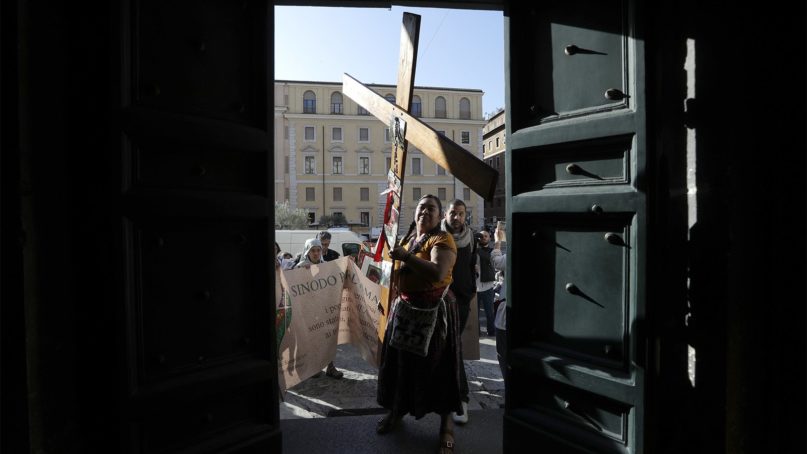VATICAN CITY (RNS) — Bishops voted on the final document of their Vatican summit (Oct. 6-27) on the Pan-Amazonian region on Saturday, taking preliminary steps toward the ordination of married men to the priesthood, the female diaconate and the creation of an Amazonian Rite.
The bishops approved with a two-thirds majority on all the 140 paragraphs in the document, which focuses on further inclusion of laity and women in the Catholic Church’s ministry in the region.
The more than 180 bishops at the synod voted on the text of the final document, paragraph by paragraph.
The most contested sections were the ones concerning the roles of the female diaconate (30 votes against), the viri probati — a discussion of ordaining married “men of proven virtue” to the priesthood — (41 votes against) and the creation of an Amazonian rite (29 votes against), each of which saw a larger number of the episcopacy voting against them.
The bishop’s voted-on final document does not have any real decision-making power. Their recommendations will be considered by Pope Francis, who is expected to release an apostolic exhortation on the Amazon sometime in the next 6 months.
They mainly ask for further discussion on the female diaconate, on the ordination of married men and on the creation of a specific rite that reflects the culture of the Amazonian peoples.
During his closing remarks at the synod on Saturday, Francis praised the spirit of the discussions among the bishops. But he also criticized the discussions on the final document for “falling short” on recognizing the role of women in the church.
“We haven’t yet comprehended what women mean for the church and we stay in the functional side” he said, adding that “the role of women in the church goes much further than functionality.”
In the document, the bishops said they wished to “share their experience and reflections” with the Commission for the Study of the Female Diaconate, created by Pope Francis in 2016 and tasked with providing further study and historical context for the role of women in the early church.
Francis said he interprets the document as calling for the creation of a second commission to look into the historic role and diaconate of women in the church. He added that while the first commission did not reach a comprehensive conclusion, he will submit it to a new commission that, with the help of the Vatican’s Congregation for the Doctrine of the Church, will ensure women seeking further inclusion will “be heard.”
Bishops have been grappling with the lack of priests to minister to the numerous indigenous peoples in the Amazon region, which is spread over nine countries in Latin America. Women deacons would be able to preach, distribute the Eucharist and officiate at weddings, baptisms and funerals. Deacons may not hear confessions or consecrate the Eucharist.
In order to address the shortage of priests, amid growing competition from Pentecostal denominations, the bishops also voted to encourage the ordination of tested married men to the priesthood.
“We propose to establish criteria and dispositions on the part of the competent authority, to ordain as priests suitable and esteemed men,” the document states, “who have had a fruitful, permanent diaconate, received an adequate formation for the priesthood, and have a legitimately constituted and stable family, to sustain the life of the Christian community through the preaching of the Word and the celebration of the Sacraments in the most remote areas of the Amazon region.”
The bishops acknowledged “celibacy as a gift of God,” but added that “the legitimate diversity does not harm the communion and unity of the Church, but expresses and serves it.”
The document also supports creating an “Amazonian rite,” a liturgy that would better reflect the Amazonian region.
The Catholic Church already recognizes over two dozen liturgical rites, which usually have their own bishops and specific liturgies. The bishops at the synod proposed the creation “of a competent commission to study and dialogue, according to the customs and traditions of the ancestral peoples, the elaboration of an Amazonian rite that expresses the liturgical, theological, disciplinary and spiritual patrimony of the Amazon.”
The word “conversion” occurs often in the document.
At the press conference following the final vote, Cardinal Michael Czerny, the under-secretary for the Migrant and Refugee section of the Vatican Department for Integral Human Development, explained why the bishops used that term.
“Without conversions, we are discovering there are really no new paths, we are repeating what we have done before, we talk about it more, but there is no real change,” Czerny said. “But I think with the Amazon burning, people are recognizing things have to change.”
“If we are going to meet the problem, we are going to have to change — and the word conversion is a very strong word for change,” he added.





